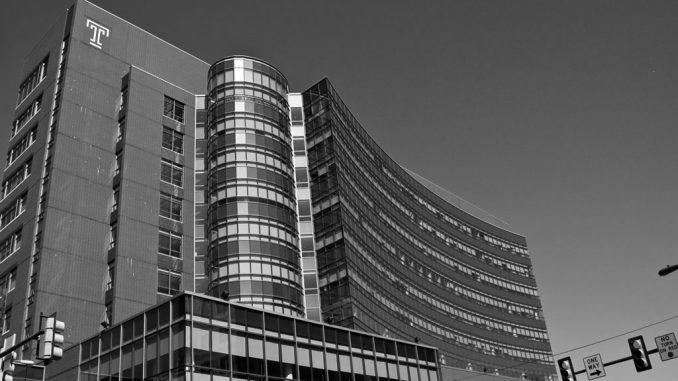
When Temple University’s Health System found itself smacked with a significant credit downgrade in summer of last year, the university’s Chief Financial Officer Ken Kaiser was concerned, but not surprised.
“It was expected,” Kaiser said of the downgrade to the systems’ credit rating. “It’s just really been building for some time. It’s the population they serve and the scale at which they operate. It’s just a difficult market… Almost like a perfect storm for those guys and for us.”
That perfect storm has been brewing for the university’s health system for decades, from its humble beginnings run out of a converted row home to the massive Health Sciences Campus. A fixture in North Philadelphia since the late 19th century, Temple University Health Systems, including its hospital and educational facilities, have grown in to a community staple, serving some of Philadelphia’s roughest neighborhoods.
But the health systems’ noble mission of serving its community, regardless of profit margin, has emerged as an anchor on the university’s greater financial landscape, culminating in last year’s credit rating threats and downgrades that could have serious repercussions on the Health System’s borrowing power.
A blurry line separates the university and its hospital namesake. Both are considered separate corporations and hence have separate credit ratings. But the university has been a consistent balloon of financial support to its sister campus up Broad Street and direct difficulties of the hospital become indirect to the university.
“Although we’re separate corporations, it all still reports up to the president,” Kaiser said. “[The Health System’s] ability to borrow money is greatly affected by the credit rating. So if they get downgraded, they have less and less access to capital.”
It’s one more installment in a torrid financial history for Temple University Hospital, which has found itself front and center since three high profile federal credit agencies – Moody’s, Fitch’s and Standard & Poor’s – threatened downgrades to the university’s credit rating this summer, citing its ties to the Health System.
“The review for downgrade reflects our concern that the link between Temple University (Temple) and Temple University Health System (TUHS) may stress resources of the university with TUHS’s downgrade to Ba2, negative,” according to a July 2013 report from Moody’s Investor Service.
A consistently weak financial history, the report said, is further weighed down by the challenges of the hospital’s extenuating factors: low-income neighborhoods that foster crime and don’t attract private insurers.
“[The Health System] has been operating under great stress for probably five plus years or so, kind of coinciding with the market crash,” Kaiser said.
The health system, the report says, “is challenged by a weak fundamental credit profile, including challenging demographics, a highly leveraged balance sheet, and increasing dependence on supplemental Commonwealth funding.”
That’s not news to Kaiser, who said the system is in a unique landscape, both literally and financially, which doesn’t ease its course through financial hardship.
“Location and the population that the hospital serves are one of the major issues that influences their financial performance,” Kaiser said. “Over 80 percent of the hospital’s inpatients are covered by government programs, so it’s what we would call a very weak payer mix. [There’s] not a lot of people with private insurance.”
At first glance, strides in healthcare reform would appear to be the health system’s saving grace. But Kaiser isn’t so sure. New marketplaces could take money away from public assistance, leaving many who chose not to invest in the Affordable Care Act marketplace – and the health system that serves them – at a disadvantage.
“It’s too early to fully appreciate the impact of the Affordable Care Act on the delivery and financing of healthcare,” Jeremy Walter, a spokesman for the hospital said in an email. “Clearly, though, the provisions of the ACA have not been sensitive enough in addressing the vital role of large, urban safety-net hospitals like Temple University Hospital.”
The problem, Kaiser said, is that the new system could drain money from public assistance funds, which many of the system’s patients rely on heavily. But the nascence of the new healthcare system makes predictions impossible, Kaiser said.
“In effect, Temple University Hospital is Philly’s public hospital,” Kaiser said. “So that’s a challenge.”
It’s not, however, a challenge that was unexpected. Even with the credit downgrade, Kaiser said the health systems’ financial health was always of concern, and that university officials knew that the actual rating was only an outgrowth of the institution’s deeper problems.
“We knew the issues that were going on with the health system. We weren’t concerned with the rating per se, but concerned with the underlying reasons for the rating,” Kaiser said.
But, he added, he believes the hospital is on track to meet their budget this time around. Although it’s early in the fiscal year, Kaiser said he expects the hospital to a make a modest step forward after the downgrade.
“At this point, things look like they could be on-budget,” he said. “They could be a little worse, they could be a little better.”
Ali Watkins can be reached at allison.watkins@temple.edu or on Twitter @AliMarieWatkins.



Be the first to comment